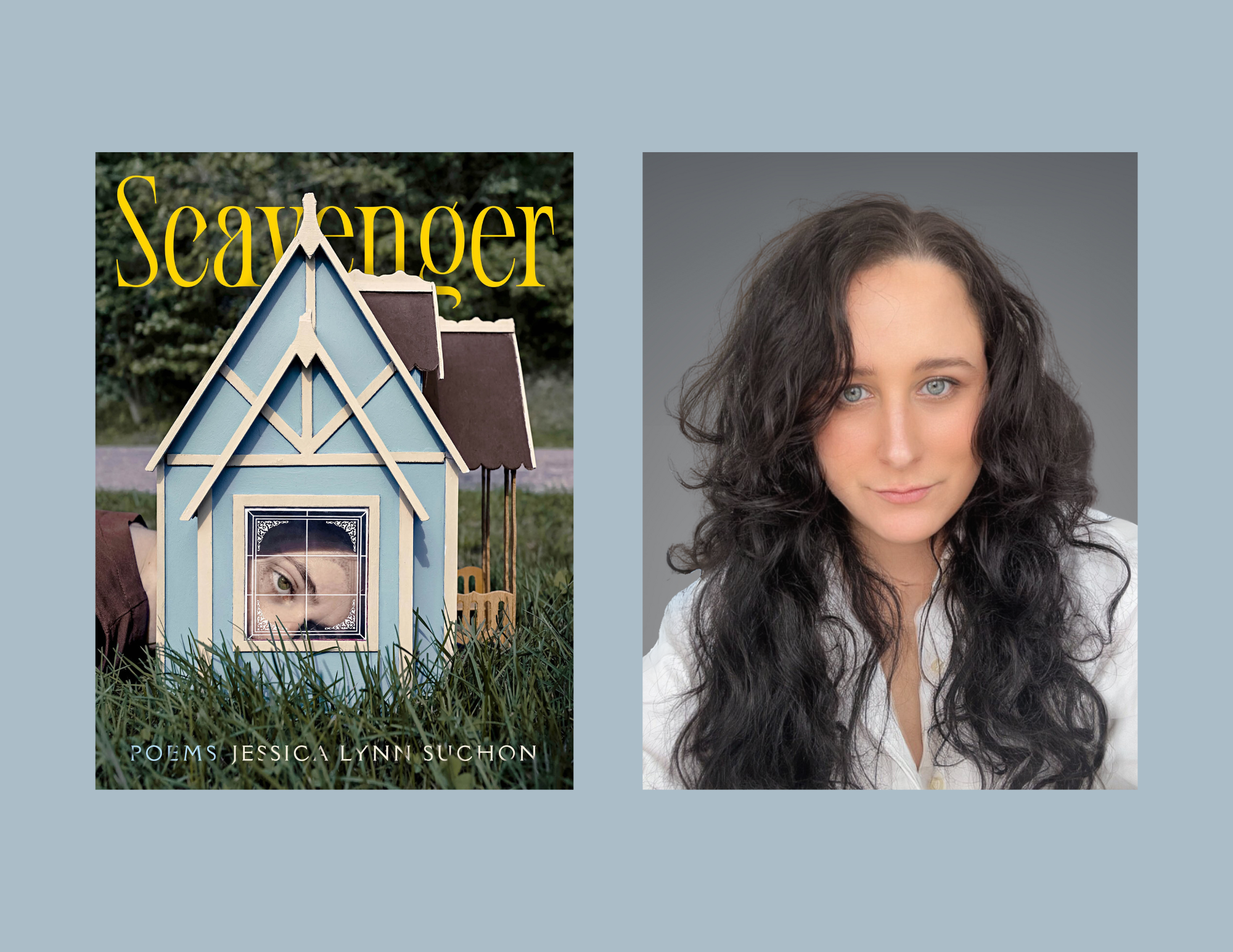Jessica Lynn Suchon is a poet and a graduate of Southern Illinois University. She is the author of the poetry book Scavenger and has published poetry in Copper Nickel and Ninth Letter. Suchon has received honors from The Aspen Institute, the Academy of American Poets, and Best New Poets.
Alexis Drew: Why name the book Scavenger and what inspired you to get into poetry?
Jessica Lynn Suchon: I’ve always really enjoyed writing and creating stories ever since I was little. I would always write songs and record movies on my family’s camcorder. But I think poems are what I was always most drawn to. During class I would always find myself writing poems in the margins of my notes. It just became a very natural way of processing and thinking though things on a day to day basis. When I got to college I originally went as a journalism major. I ended up going into English instead with creative writing as a specialty and then eventually went to grad school for poetry as well. It just became a large part of my academic life as well as my day to day life.
I think ultimately the reason I chose the name Scavenger was, it shows up in the manuscript. There’s a poem and a line that goes ‘scavengers found the doe before us, but we find what is left.’ It’s about scavengers finding this dead deer and picking it apart and taking all the parts of it. There’s mostly two characters the manuscript focuses on and in a way both of those people and the animals they’re in the landscape with also function as scavengers. They’re both trying to take something from the other. I think a lot of times in our interactions with people, whether we mean to or not, we are subconsciously scavenging for certain things we feel like we’re missing from our lives. There are ways we sort of pick each other apart to find those missing things from ourselves.
AD: Is there a reason you chose to format specific poems the way you did?
JL: Some of those poems were just fun, and the idea kind of rose from a certain source of inspiration where I wanted the form to meet that inspiration. With ‘Cygnus’ I was thinking of a constellation and I thought it’d be really interesting to form a poem like a constellation. I was thinking what that would look like if I was forming a formation of stars but, also gathering a story from it. There were also poems where it just felt like, here’s a narrative that I want to get out on a page and what stories can I tell within individual lines, within individual stanzas, rather than just the poem as a whole. Some of it was just fun experimentation and challenging myself to see what I can do with new formats. With others, the story told within them drives the format a little bit.
AD: Do you consider yourself a feminist poet? What genre do you associate yourself with?
JL: I think in the past and probably when I was writing these poems I would have definitely said yes. I mean there is an arc to these poems and this truth to them that really seems like an experience many women have unfortunately. I think that in writing this book, it takes the shape it does because I’m the person writing it. I don’t think the book is different from other narratives. The only thing that makes a difference is that I chose the medium, the metaphors, and where the line breaks were. I think what’s notable is how many people can read these poems and see themselves or see somebody they love in them. That speaks to a way that there is this notion of toxic masculinity, and to a greater extent white supremacy, that affects everybody in society. Unfortunately, some of us are victims to it one way or another, so I think that just by nature I am a woman who exists in society and interacts with people in this society. I think that makes most things about this collection inherently feminist. I don’t know that I can really say that I think of myself as a writer of a particular genre, but I do think that all writers are political in a sense because we are writing about the world we live in and the world we live in is political.
AD: Can you tell me about how this work compares to others you have created such as something in Copper Nickel or Ninth Letter?
JL: A lot of my other poems that I worked on were also around the same time as a lot of the poems that were seen in Scavenger. Ultimately I made them all a part of a larger collection that I am still working on. A lot of them were conceptualized and/or written around the same time. I think a lot of the other pieces you see from me online and in various journals feed into that same collection as I had originally conceptualized it. Even in those poems that are a part of other ideations there are some things that I obsessively write about or write through or kind of ponder on through writing. I think that’s because a lot of the things we obsess over are because we don’t necessarily have conclusions or answers, and we’re just finding new ways to explore them and open them up some more. I think I’ve made peace that I might have some of the same common threads looping through my work for the rest of my life. And if I do, I find new ways to explore them or new ways to play with craft. As I get older and have life changes the threads may change a little even if still being pulled through.
AD: Anything new you are working on? What do you hope to grasp from your audience in future pieces?
JL: I do have some other things that I have been working on. That full length collection that some of the pieces from Scavenger had originally been written for, I’ve been working on that for some time and I think I’m concluding that working period. I’m hoping that I’ll be able to start sending it off for consideration soon for a first full length poetry book. In 2019 I was a part of the Tennessee Playwrights Studio Fellowship. I worked on a full length play that I wrote a draft of while I was a part of that, and I’ve been working on re-writes to that draft for some time. That is also almost complete, and I’m hoping I’ll be able to do something with that soon. I also have a couple of musical collaborations coming up. I do a lot of work with my friend from high school who is the composer Stephanie Anne Boyd. We’ve been working on some projects together recently that we’re really excited about.
I think as far as audience goes, I sometimes am still amazed that I’ve been able to have any audience at all. This has been very exciting to me. I think it’s been such a privilege to have an audience and people who are interested in hearing what you have to say about anything, especially multiple times. I’m always really appreciative of people who are continuously championing my work, but I always do really love when I can reach somebody new and connect with them, and just be able to have a conversation and/or relate on some level. I’ve been able to exchange chapbooks with a couple other writers. It’s been a lot of fun to connect with other writers in that way. I think some of the most rewarding responses I’ve had to my writing are often when we’re debating things online, which I’ve stopped doing, but I admire people that continue putting up that fight and having those conversations with people online. Some of the most rewarding experiences I’ve had is after reading, somebody who’s not necessarily in what I consider the usual demographic of my audience will come speak to me. It is a monumental thing to just change somebody’s beliefs about things that they’ve probably had beliefs about for a very long time. Any time I can get people to reconsider their point of view or previous thoughts on certain situations and things that are outside of their life experiences is really incredible.
Learn more about Jessica Lynn Suchon on her website and purchase Scavenger here.

